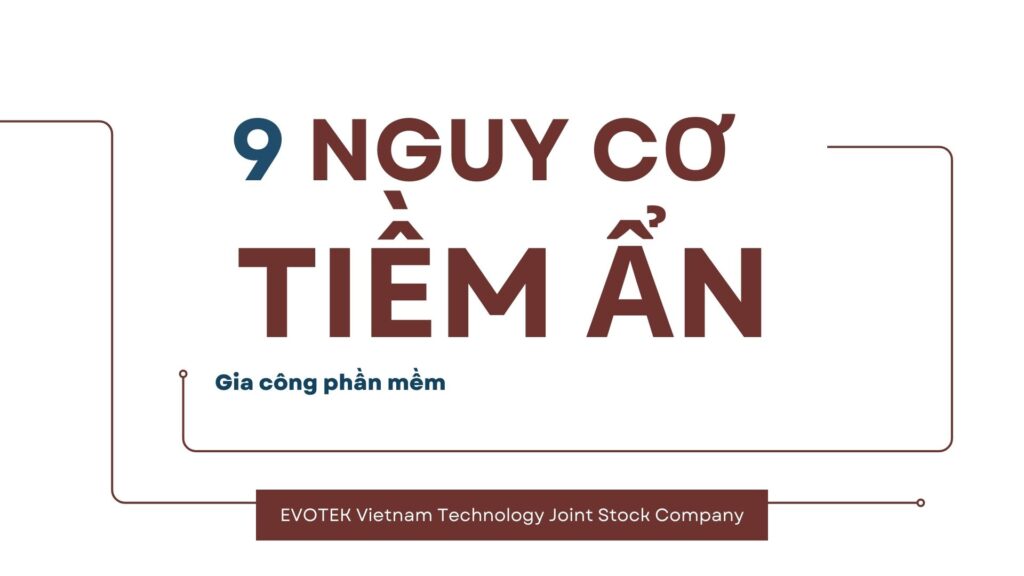Gia công phần mềm không chỉ mang lại cơ hội mở rộng và tiết kiệm chi phí mà còn tiềm ẩn một số rủi ro đáng kể. Để đạt được thành công, việc nhận biết và quản lý những nguy cơ này là bước quan trọng không thể bỏ qua. Bài viết này sẽ đi sâu vào 9 rủi ro hàng đầu mà doanh nghiệp thường gặp khi gia công phần mềm, đồng thời tìm hiểu cách tiếp cận và quản lý chúng một cách hiệu quả.
9 nguy cơ tiềm ẩn khi gia công phần mềm
1. Độ tin cậy
Độ tin cậy và sự tin tưởng là một trong những rủi ro lớn nhất mà các công ty phải đối mặt khi outsourcing phát triển phần mềm. Hầu hết các công ty đều quảng cáo về kinh nghiệm sâu rộng và đưa ra những cam kết hoàn hảo. Tuy nhiên, không phải công ty nào cũng thực sự có năng lực như họ tuyên bố.
Để giảm thiểu rủi ro này, các công ty cần dành thời gian nghiên cứu kỹ lưỡng về đối tác tiềm năng. Các khía cạnh cần xem xét bao gồm:
- Lịch sử hoạt động,
- Dịch vụ và sản phẩm
- Các dự án điển hình
- Đánh giá của bên thứ ba độc lập và phản hồi từ các khách hàng cũ.
Trên cơ sở đó, công ty có thể đưa ra quyết định hợp tác với đối tác nào thực sự đáng tin cậy, tránh lãng phí thời gian và ngân sách cho những hợp tác không hiệu quả. Đồng thời, việc xây dựng mối quan hệ minh bạch, cởi mở và lâu dài cũng giúp tăng cường sự tin tưởng giữa hai bên.
2. Thiếu chuyên môn về lĩnh vực
Thiếu chuyên môn về lĩnh vực là một thách thức phổ biến khi outsourcing phát triển phần mềm. Các dự án phần mềm thường đòi hỏi những yêu cầu kỹ thuật và nghiệp vụ cụ thể cho từng lĩnh vực. Tuy nhiên, nhiều nhà cung cấp dịch vụ gia công lại thiếu kinh nghiệm làm việc trong lĩnh vực của khách hàng.
Điều này có thể dẫn đến việc các nhà cung cấp không thể đáp ứng đầy đủ yêu cầu kỹ thuật đặc thù của dự án. Họ gặp khó khăn trong việc hiểu rõ bối cảnh nghiệp vụ và vấn đề mà phần mềm cần giải quyết. Do đó, chất lượng phần mềm bị ảnh hưởng, không đáp ứng được mục tiêu và kỳ vọng của khách hàng.
Để giải quyết vấn đề này, các công ty cần dành thời gian đánh giá kỹ năng và kinh nghiệm của nhà cung cấp trước khi hợp tác. Các nhà cung cấp có kinh nghiệm tương đồng trong cùng lĩnh vực sẽ là lựa chọn phù hợp hơn. Ngoài ra, khách hàng cũng cần giải thích rõ ràng mục tiêu, mong đợi của dự án để tránh hiểu nhầm. Thông qua đó, mối hợp tác giữa hai bên mới có thể đạt được kết quả tốt nhất.
3. Kỹ năng, công cụ và trình độ
Kỹ năng, công cụ và trình độ của đội ngũ phát triển là một trong những yếu tố then chốt quyết định thành công của dự án outsourcing. Tuy nhiên, đây cũng là một thách thức lớn mà các công ty thường gặp phải.
Vấn đề nảy sinh khi nhà cung cấp cam kết cung cấp đội ngũ giàu kinh nghiệm và kỹ năng cao nhưng thực tế lại phân công những nhân sự non trẻ, thiếu kinh nghiệm. Họ cũng có thể thiếu các kỹ năng công nghệ mới cần thiết cho dự án. Điều này dẫn đến chất lượng công việc không đạt yêu cầu, kéo dài tiến độ và tốn kém ngân sách.
Để đối phó với thách thức này, công ty cần đặc biệt chú trọng đánh giá năng lực thực tế của đội ngũ nhân sự. Các khía cạnh cần xem xét bao gồm: Kinh nghiệm, kỹ năng, công cụ và công nghệ mà họ đã làm việc, khả năng học hỏi công nghệ mới.
Ngoài ra, cần phải thiết lập cơ chế giám sát chặt chẽ, được báo cáo định kỳ về tiến độ và chất lượng công việc. Điều này sẽ giúp phát hiện sớm và có biện pháp khắc phục kịp thời những vấn đề phát sinh liên quan đến năng lực của nhân sự.
4. Khác biệt múi giờ
Khác biệt múi giờ là một thử thách không thể tránh khỏi trong các dự án outsourcing phần mềm cho đối tác ở nước ngoài. Sự khác biệt về múi giờ giữa các nước khiến việc trao đổi thông tin và phối hợp công việc gặp nhiều trở ngại.
Cụ thể, các vấn đề thường gặp phải bao gồm:
- Khó tổ chức các cuộc họp, trao đổi khi một bên phải làm việc vào ban đêm hoặc sáng sớm.
- Chậm trễ trong giao tiếp và phản hồi do thời gian chờ đợi phản hồi từ bên kia.
- Khó khăn trong việc cung cấp hỗ trợ kỹ thuật và khắc phục sự cố ngoài giờ làm việc.
Để khắc phục vấn đề này, các công ty cần:
- Lựa chọn nhà cung cấp có khả năng hỗ trợ kỹ thuật 24/7 để hạn chế tối đa sự gián đoạn.
- Sử dụng các công cụ hỗ trợ công tác nhóm, giao tiếp và quản lý dự án hiệu quả giữa nhiều múi giờ.
- Xây dựng quy trình làm việc linh hoạt, tối ưu thời gian. Các nhóm khác múi giờ có thể xoay ca, chồng lấn giờ làm để phối hợp hiệu quả.
- Thiết lập cơ chế báo cáo và cập nhật tình hình rõ ràng để tránh nhầm lẫn.

Với sự chuẩn bị kỹ lưỡng, doanh nghiệp hoàn toàn có thể vượt qua thách thức về múi giờ để đạt được mục tiêu dự án.
5. Mất kiểm soát dự án
Mất kiểm soát dự án là một trong những rủi ro lớn nhất khi thuê ngoài phát triển phần mềm. Khi giao phần lớn công việc cho đối tác, khách hàng có thể mất đi quyền quyết định về nhiều khía cạnh của dự án.
Cụ thể, một số vấn đề hay gặp phải bao gồm:
- Đối tác tự ý thay đổi phạm vi, tiến độ mà không tham vấn ý kiến khách hàng.
- Sử dụng công nghệ khác so với thỏa thuận ban đầu mà không có sự đồng ý của khách hàng.
- Không cung cấp quyền truy cập vào mã nguồn, khó khăn trong việc yêu cầu bổ sung tính năng.
- Thiếu sự minh bạch trong quá trình phát triển, khó kiểm soát chất lượng.
Để khắc phục tình trạng này, khách hàng cần:
- Xây dựng kế hoạch dự án chi tiết, rõ ràng.
- Thiết lập cơ chế báo cáo và cập nhật tiến độ thường xuyên.
- Yêu cầu quyền truy cập mã nguồn và kiểm soát chất lượng.
- Chỉ định đầu mối duy nhất để trao đổi với nhà cung cấp.
- Xây dựng mối quan hệ hợp tác lâu dài, cởi mở với đối tác.
Thông qua đó, khách hàng có thể giữ vai trò tích cực hơn trong việc giám sát và định hướng dự án, tránh tình trạng mất kiểm soát hoàn toàn.
6. Vấn đề bảo mật
Quyền riêng tư, bảo mật và an toàn dữ liệu luôn là vấn đề nhạy cảm khi lựa chọn đối tác gia công phát triển phần mềm. Việc chia sẻ thông tin và giao quyền truy cập cho bên thứ ba tiềm ẩn rủi ro lộ dữ liệu cá nhân, mã nguồn và tài sản trí tuệ. Để hạn chế rủi ro, công ty cần lựa chọn đối tác có uy tín, có các chứng chỉ bảo mật thông tin đáng tin cậy như ISO 27001. Hai bên cần ký kết các thỏa thuận bảo mật chặt chẽ, ràng buộc về mặt pháp lý. Công ty cũng nên mã hóa dữ liệu trước khi chia sẻ cũng như kiểm soát chặt chẽ quyền truy cập của đối tác. Thông qua đó, công ty có thể yên tâm hơn khi hợp tác với đơn vị thứ ba, vừa đảm bảo an toàn thông tin cho mình.

7. Chi phí ẩn
Chi phí phát sinh và không rõ ràng là một thách thức phổ biến trong các dự án outsourcing phần mềm. Vấn đề bắt nguồn từ việc các nhà cung cấp thường đưa ra báo giá ban đầu thấp để trúng thầu. Tuy nhiên, trong quá trình triển khai dự án, họ lại đưa ra nhiều khoản phí phát sinh như:
- Phí nâng cấp, bảo trì phần mềm sau khi hoàn thành dự án.
- Phí tích hợp, triển khai hệ thống lên môi trường thực tế.
- Phí xử lý lỗi, cung cấp bảo hành dự án.
- Phí làm thêm giờ, cấp tốc để đáp ứng tiến độ dự án.
Những khoản phí phát sinh này đôi khi chưa được thỏa thuận rõ ràng từ đầu, khiến chi phí dự án vượt xa dự toán ban đầu.
Để khắc phục vấn đề trên, công ty cần:
- Yêu cầu báo giá chi tiết từng hạng mục công việc ngay từ đầu.
- Ký hợp đồng chặt chẽ, chi tiết về các loại phí có thể phát sinh.
- Giới hạn phạm vi dự án và yêu cầu thay đổi trong hợp đồng.
- Sử dụng luật sư để rà soát hợp đồng trước khi ký kết.
- Kiểm soát chặt chẽ tiến độ, ngân sách để hạn chế phát sinh phí ngoài kế hoạch.
Những biện pháp trên sẽ giúp công ty chủ động kiểm soát chi phí, tránh những khoản phí phát sinh đột xuất khi hợp tác với đối tác thuê ngoài.
8. Chất lượng dịch vụ
Chất lượng dịch vụ không đạt yêu cầu có thể ảnh hưởng nghiêm trọng đến hiệu quả của dự án.
Cụ thể, một số vấn đề về chất lượng có thể gặp phải bao gồm:
- Sản phẩm không đáp ứng đúng yêu cầu kỹ thuật và nghiệp vụ ban đầu.
- Mã nguồn kém chất lượng, khó bảo trì và nâng cấp sau này.
- Giao diện khó sử dụng, trải nghiệm người dùng kém.
- Quy trình phát triển không chuyên nghiệp, thiếu tài liệu.
- Thiếu hỗ trợ sau khi bàn giao dự án.
Để khắc phục vấn đề này, công ty cần:
- Đặt ra các tiêu chí chất lượng rõ ràng, có thể đo lường được.
- Kiểm tra, giám sát chặt chẽ quá trình phát triển và chất lượng sản phẩm.
- Yêu cầu đối tác tuân thủ các quy trình phát triển chuyên nghiệp.
- Xây dựng quan hệ hợp tác lâu dài với nhà cung cấp để đảm bảo cam kết chất lượng.
- Sử dụng các công cụ quản lý chất lượng hiện đại như kiểm thử tự động.
Thông qua các biện pháp trên, công ty có thể nâng cao năng lực quản lý chất lượng dịch vụ của đối tác, giảm thiểu rủi ro về chất lượng sản phẩm.
9. Giao tiếp kém
Giao tiếp kém hiệu quả là thách thức phổ biến trong các dự án phát triển phần mềm thuê ngoài, đặc biệt là với đối tác nước ngoài.
- Sự khác biệt về ngôn ngữ, văn hóa giữa hai bên dễ dẫn đến nhầm lẫn, hiểu sai ý định của nhau.
- Việc thiếu một kênh liên lạc rõ ràng, thống nhất giữa khách hàng và nhà cung cấp dễ gây ra tình trạng truyền đạt thông tin không nhất quán.
- Cách thức giao tiếp không hiệu quả (email, chat chung) khiến thông tin dễ bị sót lọt, hiểu nhầm.
- Ý tưởng và yêu cầu của khách hàng không được truyền đạt chính xác tới các nhà phát triển.
- Các nhà phát triển thiếu kỹ năng giao tiếp, diễn đạt khiến khách hàng khó nắm bắt tiến độ.
- Chênh lệch múi giờ khiến hai bên khó tổ chức trao đổi và họp lệch giờ.

Để cải thiện giao tiếp, cần có một kênh liên lạc thống nhất, sử dụng các công cụ giao tiếp hiệu quả, tổ chức họp định kỳ và đào tạo kỹ năng giao tiếp cho các bên.
EVOTEK – Đối Tác Uy Tín Cung Cấp Dịch Vụ Thuê Ngoài Phát Triển Phần Mềm
EVOTEK là công ty phát triển phần mềm hàng đầu chuyên về thuê ngoài IT (IT Outsourcing). Được thành lập từ năm 2018, EVOTEK tự hào là đối tác tin cậy của hơn 300 doanh nghiệp trong và ngoài nước.
Các yếu tố làm nên sự thành công của Evotek bao gồm:
- Evotek có đội ngũ lập trình viên giàu kinh nghiệm, được đào tạo bài bản, thành thạo nhiều ngôn ngữ lập trình hiện đại. Các kỹ sư của Evotek đa phần tốt nghiệp các trường đại học hàng đầu, nhiều kỹ sư có kinh nghiệm làm việc tại thị trường nước ngoài.
- Evotek áp dụng các quy trình phát triển chuyên nghiệp dựa trên Agile, tuân thủ các chuẩn mực quốc tế như CMMI, ISO 9001, ISO 27001. Điều này giúp nâng cao năng suất và chất lượng phát triển.
- Tập trung đầu tư nghiên cứu và phát triển, luôn cập nhật các công nghệ mới.
- Với nguồn nhân lực dồi dào, Evotek có thể đưa ra mức giá cạnh tranh hơn so với các đối thủ trong khu vực.
- Bảo mật thông tin khách hàng tuyệt đối.
Những ưu thế này giúp Evotek vượt trội trong lĩnh vực gia công phần mềm tại Châu Á, mang đến cho khách hàng sự hài lòng về chất lượng sản phẩm và dịch vụ
Các dự án phát triển phần mềm của EVOTEK

 English
English 日本語
日本語 한국어
한국어 简体中文
简体中文





